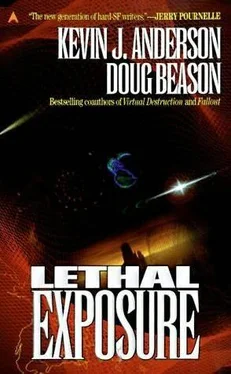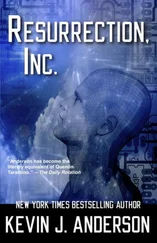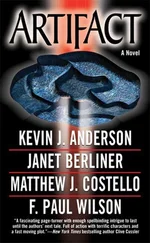The limousine eased into a traffic circle behind a cart pulled by a camel. White Brahma bulls munched on grass in the center of the circle. A pair of monkeys scampered across the windshield, then dashed off onto the hood of another vehicle. Bicyclists, sandal-footed pedestrians, women in sarongs paraded in front of him. A dark raj wearing a British pith helmet, red jacket, and white gloves nonchalantly directed traffic at the end of the traffic circle.
Bretti shrank back in his seat, overwhelmed by the people, the chaos. “This is like wandering through the movie set of Jumanji .”
His guide twisted in his seat. “Yes, much to see here, sir.” He hesitated, as if worried he might offend Bretti. “If I may make a small suggestion, I noticed that sir was having difficulty with our street urchins. They mean no harm. But if sir would be kind enough to keep his wallet in his front pocket, then he will not have to worry.”
Bretti grunted and transferred his wallet to his front pocket, dreading how much he would have to get used to in this crazy, mixed-up place. His stomach felt like lead. What if he had to remain here in exile for the rest of his life? Maybe even prison in the U.S. would be better than that.
The limo turned right and stopped at a gate in a high brick fence that shielded a large, enclosed compound from view. The driver flashed an ID, and the guard waved them through.
Once inside, Bretti felt as if he had been transported to another world. Yellow, red, and blue flowers provided startling color in immaculately groomed gardens arranged in curving lines that drew the eye toward a central white building, four stories tall. Neatly trimmed trees with white lines painted around their bases were widely spaced in radial lines emanating from the main building.
Bretti noticed several cottages and a dormitory beside the central building, with a volleyball net and swing sets in the rear. Three satellite dishes, each thirty feet in diameter, pointed at different azimuths. Aside from the guard that had waved them in, he saw no people or animals. Only blessed peace and quiet.
They drove along a curving path to the front of the building. A big-boned man with a potbelly and a blue turban stepped out from under an awning as the car glided to a stop. He made no attempt to open the passenger door, so Bretti opened it himself and stepped out.
“Dr. Bretti? I am Dr. Punjab, director of the Sikander Lodi Research Institute. Mr. Chandrawalia has told us much about you.”
Bretti pressed his lips together. He was too weary and too frazzled to keep correcting these towelheads. How was he ever going to live here, settle down, adjust to this backward, noisy, crowded culture? “I’m glad to be here, finally. I’ve been told my equipment will be arriving here after me.”
Dr. Punjab led him inside the main building. “Actually, your equipment arrived several minutes ago. We had a special courier meet your plane. Would you care to inspect your device in our high bay area?”
“Sure.” Bretti followed Punjab inside the air-conditioned building, annoyed that his Penning trap was getting better treatment than he was. But he had gotten himself into this. Chandrawalia had made no promises, other than payment for the delivery of antiprotons stolen from the accelerator.
In the wide lobby, display cases showed scale models of huge capacitor banks, satellites, launch vehicles, and computer-generated images. Explanation cards beneath the models were written in nine different languages, English at the bottom.
A greeting line of eleven scientists and engineers, all but one wearing a turban, bowed and shook his hand. Everyone smiled. Bretti found most of their names impossible to pronounce, and his eyes glazed over.
Before they entered the high bay experimental area, one skinny man stepped up and said, “I am most anxious to learn about how you enhance your beam to increase p-bar production. It is a miraculous breakthrough.”
“Uh, thanks.” Bretti wondered if they would be very upset when they learned that the enhancement process had all been Dumenco’s wild theory, not his own. And that he had brought the antimatter in one of the old, simple magnetic bottles instead of a crystal-lattice trap. But all they really wanted was the antimatter, for their high-tech medical applications and cancer treatment possibilities. They’d get the rest of the p-bars later; that was the important thing.
Dr. Punjab steered him up a long flight of metal stairs to a balcony that overlooked a cavernous high bay. Punjab ’s staff followed at a polite distance.
Four stories high and half a football field deep, the high bay experimental area sprawled in front of him. A yellow twenty-ton crane hung from the ceiling; white-painted concrete blocks each a yard long and two feet thick were stacked in a maze, creating small storage alcoves against the wall.
At the center of the high bay a tall cylinder stood twenty feet across with six blue rectangular arms, each as big as a boxcar, spread out radially like a six-sided star. Bretti saw the diplomatic pouch container holding the Penning trap near the central cylinder.
Dr. Punjab grasped the railing and spoke, pride evident in his voice. “This is Experiment three hundred twenty two, our one hundred megajoule capacitor bank. It is capable of discharging hundreds of megamperes of current in less than five microseconds to a center load- we can produce over thirty trillion watts of power here. It is the largest fast capacitor bank in the world.” He pointed at a long, thin tube on the side of the bay near where Bretti’s still-crated Penning trap sat. “Our antimatter injector will dump your p-bars directly to the center of the load.”
Bretti looked out over the experimental area and sniffed. “This looks like a high-current physics experiment. What does this have to do with medical applications? How are you going to treat patients if the machine is half the size of a hospital?”
“Medical applications? Oh, yes.” Punjab smiled tightly. “This is a proof-of-principle experiment, Dr. Bretti. We have much larger plans for your antimatter.”
Bretti glanced around the bay area. “Well, use it sparingly. I’m not sure when you’ll be getting the rest.”
Punjab scowled at him. “You are not in a position to dictate terms, Dr. Bretti. Come. You must show us how to extract the antimatter.”
Bretti followed the chief scientist back down the metal stairs to the high bay floor. Whining sounds of a machine shop came from a door at the base of the stairs. He smelled hot metal, lubricants, capacitor oils-refreshing after the nauseating smells of sardine-packed humanity. Technicians dressed in blue lab coats and orange or green pants milled around diagnostic units set in cement-block cubbyholes. Weirdly out of place, two guards with rifles sauntered along a catwalk, high above the floor.
Bretti peered at one of the capacitor boxes for Experiment 322, reading the manufacturer’s mark on the side. “Maxwell capacitors? This all seems pretty standard for a high-capacitor lab.” He glanced at the guards patrolling overhead. “Mr. Chandrawalia emphasized the need for secrecy. Why?”
Dr. Punjab studied Bretti for a moment. While the rest of his staff remained in the background, he brushed back his beard and spoke in slow, carefully measured tones.
“Mr. Chandrawalia explained to you the, ah, commercial applications of what we intend to do here? Manufacture artificial medical isotopes to sell on the world market?”
“Of course,” said Bretti. “It would take years to get permission to do that at Fermilab-if they ever allowed it in the first place. The accelerator is a research tool, and if some congressman ever found out that we were pouring millions of dollars into underwriting India ’s latest commercial activity, he’d have a fit. But we’re in India right now, and it seems a little cloak-and-daggerish to keep all this so secret.”
Читать дальше












